|
|
|
|
|
|
|
|
|
|
|
|
|
|
|
|
|
|
|
|
|
|
|
|
|
|
|
|
|
|
|
|
|
|
HANNOVER FAIR 1995 - 2019
 HANNOVER FAIR 2019 HANNOVER FAIR 2019
 HANNOVER FAIR 2018 HANNOVER FAIR 2018
 HANNOVER FAIR 2017 HANNOVER FAIR 2017
 Arno's Forum Interview 2017 Arno's Forum Interview 2017
 HANNOVER FAIR 2016 HANNOVER FAIR 2016
 HANNOVER FAIR 2015 HANNOVER FAIR 2015
 HANNOVER FAIR 2014 HANNOVER FAIR 2014
 HANNOVER FAIR 2013 HANNOVER FAIR 2013
 HANNOVER FAIR 2012 HANNOVER FAIR 2012
 HANNOVER FAIR 2011 HANNOVER FAIR 2011
 HANNOVER FAIR 2010 HANNOVER FAIR 2010
 Arno's
Forum Interview 2010 Arno's
Forum Interview 2010
 HANNOVER FAIR 2009 HANNOVER FAIR 2009
 Arno's Video during HF 2009 Arno's Video during HF 2009
 Arno's Forum Interview 2009 Arno's Forum Interview 2009
 HANNOVER FAIR 2008 HANNOVER FAIR 2008
 Arno's Forum Interview 2008 Arno's Forum Interview 2008
 HANNOVER FAIR 2007 HANNOVER FAIR 2007
 Arno's Forum Interview 2007 Arno's Forum Interview 2007
 HANNOVER FAIR 2006 HANNOVER FAIR 2006
 Daily Networking evenings Daily Networking evenings
 HANNOVER FAIR 2005 HANNOVER FAIR 2005
 Daily Networking evenings Daily Networking evenings
 International
Commercial Visitors 2005 International
Commercial Visitors 2005
 HANNOVER FAIR 2004 HANNOVER FAIR 2004
 International
Commercial Visitors 2004 International
Commercial Visitors 2004
 HANNOVER FAIR 2003 HANNOVER FAIR 2003
 International
Commercial Visitors 2003 International
Commercial Visitors 2003
 HANNOVER FAIR 2002 HANNOVER FAIR 2002
 HANNOVER FAIR 2001 HANNOVER FAIR 2001
 HANNOVER FAIR 2000 HANNOVER FAIR 2000
 HANNOVER FAIR 1999 HANNOVER FAIR 1999
 HANNOVER FAIR 1998 HANNOVER FAIR 1998
 HANNOVER FAIR 1997 HANNOVER FAIR 1997
 HANNOVER FAIR 1996 HANNOVER FAIR 1996
 HANNOVER FAIR 1995 HANNOVER FAIR 1995
|
| |
| Visits and Workshops |
 |
 Hans-Olof Nilsson's Off-The-Grid Hydrogen House near Goteborg, Sweden Hans-Olof Nilsson's Off-The-Grid Hydrogen House near Goteborg, Sweden |
 |
 Visit at the Italian demonstration plant of MagneGasâ„¢ on February 7th and 8th, 2011 Visit at the Italian demonstration plant of MagneGasâ„¢ on February 7th and 8th, 2011 |
 |
 Hydrogen Plant of Emirates Industrial Gases Co. Ltd ( EIGC) at Dubai, UAE Hydrogen Plant of Emirates Industrial Gases Co. Ltd ( EIGC) at Dubai, UAE |
 |
 Huerta Solar en Tabernas, Spain, October 2009 Huerta Solar en Tabernas, Spain, October 2009 |
 |
 Andasol, Spain, October 2009 Andasol, Spain, October 2009 |
 |
 Antares DLR H2, Stuttgart, Germany,
September 2009 Antares DLR H2, Stuttgart, Germany,
September 2009 |
 |
 German Aerospace Center (DLR) Deutsches Zentrum für Luft-und Raumfahrt eV, Stuttgart, Germany, Institute of Technical Thermodynamics (ITT) Institute of Vehicle Concepts Stuttgart, Germany, June 2009 German Aerospace Center (DLR) Deutsches Zentrum für Luft-und Raumfahrt eV, Stuttgart, Germany, Institute of Technical Thermodynamics (ITT) Institute of Vehicle Concepts Stuttgart, Germany, June 2009 |
 |
 Brennstoffzellen-Boote für den Freizeitbereich, Hochschule Konstanz, Konstanz, Germany June 2009 Brennstoffzellen-Boote für den Freizeitbereich, Hochschule Konstanz, Konstanz, Germany June 2009 |
 |
 AFCC Automotive Fuel Cell Cooperation, Burnaby, BC, Canada June 2009 AFCC Automotive Fuel Cell Cooperation, Burnaby, BC, Canada June 2009 |
 |
 Powertech Labs Inc., a: "... wholly owned subsidiary of BC Hydro (a Crown corporation of the Government of British Columbia), Surrey, BC, Canada June 2009 Powertech Labs Inc., a: "... wholly owned subsidiary of BC Hydro (a Crown corporation of the Government of British Columbia), Surrey, BC, Canada June 2009 |
 |
 Plataforma Solar de Almería, Spain Plataforma Solar de Almería, Spain |
|
| Observations |
 |
 How Airbus conquered the How Airbus conquered the
US market in the 70s |
 |
 The Arecibo Observatory The Arecibo Observatory
Arecibo, Puerto Rico |
 |
 Hat Creek Radio Observatory, Hat Creek Radio Observatory,
Hat Creek, CA, USA |
 |
 National Radio Astronomy Observatory, Green Bank, WV, USA National Radio Astronomy Observatory, Green Bank, WV, USA |
 |
 Wright Brothers National Memorial, Kitty Hawk, NC, USA Wright Brothers National Memorial, Kitty Hawk, NC, USA |
 |
 Fuel Cell Bus Trial, Perth, Australia Fuel Cell Bus Trial, Perth, Australia |
 |
 California Hydrogen Highway, USA California Hydrogen Highway, USA |
 |
 SPACEFEST 2009, San Diego, USA SPACEFEST 2009, San Diego, USA |
|
| Impressions from worldwide Conferences, which
we attended to promote the commercialisation of Hydrogen and Fuel
Cells: |
| 2022 |
| #117 |
2nd Edition of International
Conference on
Green Chemistry and Renewable Energy |
| 2020 |
| #116 |
2020 6th International 
Conference on Environment and Renewable Energy (ICERE 2020), 24-26 February 2020, Hanoi, Vietnam |
| 2019 |
| #115 |
4th Annual ASEAN Solar + 
Energy Storage Congress & Expo 2019 14- 15 Nov, 2019 The Bellevue Manila, Philippines |
| #114 |
SFERA-III 1st Summer School &
Doctoral Colloquium at CNRS-PROMES in Odeillo, France
September 9th-13th, 2019 |
| #113 |
Starmus V, June 24 – 29, 2019
Zurich, Switzerland a global festival of science communication and art |
| 2018 |
| #112 |
Visit to NOORo I to III in 
Ouarzazate, Morocco as part of the SolarPACES 2018 conference, October 6, 2018 |
| #111 |
The Hydrogen Energy Summit 
2018 Chiang Mai, Northern Thailand Arno's presentation: Off the Grid – Unveiling new ways for our Energy supply January 26, 2018 |
| 2015 |
| #110 |
1. Klimaschutzkongress auf der 
Insel Sylt
25. September 2015
Vortrag von Arno A. Evers:
Eine „Insel- Lösung“ für Sylt?
Neue Wege zur Energieversorgung der Insel Sylt |
| 2014 |
| #109 |
6. Hamburger Klimawoche 
29. August 2014
Vortrag von Arno A. Evers:
Physikalische und Gesellschaftliche Rahmenbedingungen der Energiewende010 |
| 2012 |
| #108 |
MesseKongress RegioEnergie+++  Dreieich 2012 Dreieich 2012
9. September 2012
Vortrag von Arno A. Evers: Sind wir noch zu retten? |
| 2010 |
| #107 |
WREC World Renewable Energy Congress XI
September 25-30, 2010 
Abu Dhabi, United Arab Emirates
Oct 2010 |
| #106 |
18th World Hydrogen Energy Conference WHEC 2010,
May 16 - 21 
Essen, Germany
Jun 2010 |
| 2009 |
| #105 |
"Bright
Horizons 6" -
A Journey
to the Edge of the Cosmos 
Eastern Caribbean
Dec 2009 |
| #104 |
2009 Fuel Cell Seminar & Exposition
Palm Springs, CA, USA
Nov 2009 |
| #103 |
Fuel Cell Technologies:
FUCETECH 2009
Mumbai (Bombay), India
Nov 2009 |
| #102 |
f-cell
Stuttgart, Germany
Sep 2009 |
| #101 |
SolarPACES 2009
Berlin, Germany
Sep 2009 |
| #100 |
5th Annual Hydrogen Implementation Conference
Charleston, WV, USA
Aug 2009 |
| #99 |
Intersolar North America
San Francisco, CA, USA 
Jul 2009 |
| #98 |
European FUEL CELL FORUM 2009
Lucerne, Switzerland 
Jun 2009 |
| #97 |
HFC2009
Vancouver, Canada 
Jun 2009 |
| #96 |
telescon 2009
Vienna, Austria 
May 2009 |
| #95 |
Hydrogen Works
San Diego, CA, USA 
Feb 2009 |
| #94 |
ICEPAG 2009
Newport Beach, CA, USA 
Feb 2009 |
| 2008 |
| #93 |
HTE-HI.TECH.EXPO 2008
Milan, Italy 
Nov 2008 |
| #92 |
Fuel Cell Seminar & Exposition
Phoenix, AZ, USA 
Oct 2008 |
| #91 |
H2Expo
Hamburg, Germany 
Oct 2008 |
| #90 |
f-cell
Stuttgart, Germany 
Sep 2008 |
| #89 |
INTELEC 2008
San Diego, CA, USA
Sep 2008 |
| #88 |
2008 Formula Zero Championship
Rotterdam, The Netherlands
Aug 2008 |
| #87 |
HyForum 2008
Changsha, P.R. China
Aug 2008 |
| #86 |
WREC X 2008
Glasgow, Scotland, UK
Jul 2008 |
| #85 |
KMCM 2008
Vancouver, BC, Canada
Jul 2008 |
| #84 |
Lucerne FUEL CELL FORUM 2008 
Lucerne, Switzerland
Jun 2008 |
| #83 |
17th World Hydrogen
Energy Conference (WHEC) 
Brisbane, Australia
Jun 2008
 The role of the young generation ... The role of the young generation ... |
| #82 |
Renewable Energy Asia
Bangkok, Thailand 
Jun 2008 |
| #81 |
Selected Hydrogen Fueling Stations in California, USA 
Apr 2008 |
| #80 |
NHA Annual Hydrogen Conference 2008
Sacramento, CA, USA
Mar / Apr 2008 |
| #79 |
FC EXPO 2008 
Tokyo, Japan
Feb 2008 |
| #78 |
Der 4. Deutsche Wasserstoff 
Congress 2008
Essen, Germany
Feb 2008 |
| #77 |
ISEPD 2008 
Changwon, Korea
Jan 2008 |
| 2007 |
| #76 |
20TH World Energy Congress & Exhibition 
Rome, Italy
Nov 2007 |
| #75 |
World Hydrogen Technologies Convention (WHTC) 
Montecatini Terme, Italy
Nov 2007 |
| #74 |
2007 Fuel Cell Seminar & Exposition
San Antonio, Texas, USA
Oct 2007 |
| #73 |
KOREA ENERGY SHOW 2007 
Seoul, Republic of Korea
Oct 2007 |
| #72 |
Tenth Grove Fuel Cell Symposium 
London, UK
Sep 2007 |
| #71 |
Solar Tech India 2007 
New Delhi, India
Sep 2007 |
| #70 |
SES-Fachtagung
MYTHOS STROMLÜCKE 
Zurich, Switzerland
Aug 2007 |
| #69 |
HFCE 2007 
Shanghai, P.R. China
Jul 2007 |
| #68 |
IHEC 2007 
Istanbul, Turkey
Jul 2007 |
| #67 |
KMCM 2007 
Düsseldorf, Germany
Jul 2007 |
| #66 |
Kick Off Meeting zur Leitinnovation Mikrobrennstoffzelle 
Munich, Germany
Jun 2007 |
| #65 |
Hydrogen and Fuel Cells 2007: International Conference &
Trade Show
Vancouver, BC, Canada
April / May 2007 |
| #64 |
GENERA - Energy and Environment International Fair 
Madrid, Spain
Feb / Mar 2007 |
| #63 |
World Renewable Energy Congress [WREN] 
Fremantle, Australia
Feb 2007 |
| #62 |
Environment 2007
Exhibition & Conference 
Abu Dhabi, UAE
Jan 2007 |
| 2006 |
| #61 |
2nd Annual Fuel Cells Durability & Performance 2006 
Miami Beach, FL USA
Dec 2006 |
| #60 |
EDTA Conference & Exposition 
Washington, DC, USA
Nov 2006 |
| #59 |
The Fuel Cell Seminar 
Honolulu, Hawaii, USA
Nov 2006 |
| #58 |
Fraunhofer Symposium
Mikroenergietechnik
POWER TO GO
Berlin, Germany
Oct 2006 |
| #57 |
Renewables to Hydrogen Forum 
Albuquerque, NM, USA
Oct 2006 |
| #56 |
Alternative Transport Energies Conference 
Perth, Western Australia
Sep 2006 |
| #55 |
Power-Gen Asia 
Hong Kong, Hong Kong
Sep 2006 |
| #54 |
World Renewable Energy
Congress IX and Exhibition 
Florence, Italy
Aug 2006 |
| #53 |
R&D in the field of Hydrogen and Fuel Cell in Germany and Europe 
Clausthal, Germany
Jul 2006 |
| #52 |
Lucerne Fuel Cell Forum 2006 
Lucerne, Switzerland
Jul 2006 |
| #51 |
16th World Hydrogen Energy Conference (WHEC) 
Lyon, France
Jun 2006 |
| #50 |
NHA Annual Hydrogen Conference 
Long Beach, CA, USA
Mar
2006 |
| #49 |
FC
EXPO 2006
Tokyo, Japan
Jan 2006 |
| #48 |
Wasserstoff und Brennstoffzellen im Automobil
Essen, Germany
Apr 2006 |
| 2005 |
| #47 |
Fuel
Cell Seminar
Palm Springs, USA
Nov 2005 |
| #46 |
Internationale
ASUE-Fachtagung
Essen, Germany
Nov 2005 |
| #45 |
EHEC
2005
Zaragoza, Spain
Nov 2005 |
| #44 |
Fuel
Cell Summit:
A Road Map to Commercialization
Uncasville, CT, USA
Oct 2005 |
| #43 |
2005
Grove Fuel Cell Symposium
London, UK
Oct. 2005 |
| #42 |
WHTC
2005 World Hydrogen Technologies Convention (WHTC) Singapore, Singapore
Oct. 2005 |
| #41 |
f-cell
2005, Stuttgart, Germany
Sep. 2005 |
| #40 |
The
27th International Telecommunications Energy Conference - intelec
'05
Berlin, Germany
Sep. 2005 |
| #39 |
IHK
Nord Wasserstoff – Tagung
Lübeck, Germany
Sep. 2005 |
| #38 |
ICHS
- International Conference on Hydrogen Safety , Pisa, Italy
Sep. 2005 |
| #37 |
IHEC-2005
International Hydrogen
Energy Congress & Exhibition
Jul. 2005 |
| #36 |
93.
Bunsen Kolloquium
Jun. 2005 |
| #35 |
European
Hydrogen and Fuel Cell Technology Platform (HFP)
Brussels, Belgium
Mar. 2005 |
| #34 |
Cairo
9th International Conference on Energy & Environment
Sharm El-Sheikh, Egypt
Mar. 2005 |
| #33 |
1st
International Fuel Cell Expo
Tokyo, Japan
Jan. 2005 |
| 2004 |
| #32 |
H2PS:
The 2004 Hydrogen Production and Storage Forum,
Washington, DC, USA
Dec. 2004 |
| #31 |
Impressions
from Shanghai
Nov. 2004 |
| #30 |
Renewable Energies China incl. Hydrogen + Fuel Cells
Shanghai, PR China
Nov. 2004 |
| #29 |
Michelin
Challenge Bibendum 2004
Oct. 2004 |
| #28 |
Energy
Asia 2004
Oct. 2004 |
| #27 |
Hydrogen
and Fuel Cells 2004
Conference and Trade Show
Toronto, ON, Canada
Sep. 2004 |
| #26 |
Meetings
in Singapore,
Sep. 2004 |
| #25 |
Hydrogen
and Fuel Cell Futures Conference, Perth, Australia
Sep. 2004 |
| #24 |
Exhibiting
at World Renewable Energy Congress VIII
Denver, CO, USA
Sep. 2004 |
| #23 |
Arno
presenting at ACS National Meeting Philadelphia, PA, USA
Aug. 2004 |
| #22 |
Promotion
of FP6, for European Union, Delegation of the European Commission,
Shanghai
Jul. 2004 |
| #21 |
IHK
Energy-Podium 2004
Jul. 2004 |
| #20 |
15th
World Hydrogen Energy Conference (WHEC15)
Yokohama, Japan
Jun. 2004 |
| #19 |
Impressions
from the
Energy Forum 2004
Varna, Bulgaria
Jun. 2004 |
| #18 |
Impressions
from HYFORUM
May 2004 |
| #17 |
Impressions
from Dubai
United Arab Emirates
May 2004 |
| #16 |
Impressions
from Argentina
May 2004 |
| #15 |
Promoting
Hydrogen Production from Patagonia, Argentina
May 2004 |
| #14 |
Impressions
Zhuozheng Garden
in Su Zhou
Mar. 2004 |
| 2003 |
| #13 |
H2PS:
The 2003 Hydrogen Production and Storage Forum
Washington, D.C., USA
Dec. 2003 |
| #12 |
Impressions
from
Washington, D.C., USA
Dec. 2003 |
| #11 |
Shanghai
International Industry Fair (SIF), Shanghai, P.R. China
Nov. 2003 |
| #10 |
Energy
Asia 2003
PTC Asia 2003
CeMAT Asia 2003
Factory Automation Asia 2003
Shanghai, P.R. China
Nov. 2003 |
| #9 |
2003
WATER KOREA
Nov. 2003 |
| #8 |
NESC
2003 - 6th Int'l Conference on New Energy Systems & Conversions
Nov. 2003 |
| #7 |
Impressions
from Busan
South-Korea
Nov. 2003 |
| #6 |
2003
Fuel Cell Seminar
Miami Beach, Florida, USA
Nov. 2003 |
| #5 |
Impressions
from Shanghai, Beijing, P.R. China
Nov 2003 - Jul. 2004 |
| #4 |
f-cell
forum, Stuttgart, Germany
Sep. 2003 |
| #3 |
Hypothesis
V, Porto Conte, Italy
Sep. 2003 |
| #2 |
1st
European Hydrogen Energy Conference, Grenoble, France
Sep. 2003 |
| #1 |
Cooperation
for Energy Independence of Democracies in the 21st Century
Jerusalem, Israel
Aug. 2003 |
|
 |
 |
 |
 |
Shanghai International
Industry Fair (SIF) 2004
|
 |
|
 |
| Corporate
Information |
| home |
|
|
|
HANNOVER
FAIR 01
Convention Center, Room 2
International Conference, April 25, 2001
Energy Summit
On the
way to a Hydrogen Economy
The third
part of the conference is oriented towards the technology progress
of Hydrogen and Fuel Cells applications since the HANNOVER FAIR
2000. It offers a comprehensive view for international visitors
of the fair and to media representatives about the state of the
art and the prospects on the way to the hydrogen economy.
In the first
topic of the program "Production of Fuel of choice"
international speakers are explaining new steps in the industrial
production of hydrogen. International experts are going to show
their solutions to the use of renewable energy from wind or water
power. Representatives from worldwide market-dominating companies
are speaking about the production of Hydrogen by Electrolysers.
Under the
heading "Applications - ready for the market" producers
of Fuel Cells for stationary electrical power and heat represent
experience with a few hundred installed systems worldwide. Contributions
of international experts about Micro Fuel Cells for the electrical
supply of portable applications complete this part of the congress.
Representatives
of international companies, associations and banks, for whom the
theme of Fuel Cells represents an important task, take part in
the final discussion with the motto: "Visions only lead to
actions". The theme attends to these new technologies and
their technological, financial and strategically challenge. It
explains the way from Research and Development to commercialization
and deals with the question how to reach a wide acceptance by
the population.
The Deutsche
Messe AG strengthens its unique position as an initiator in this
congress-program for the industrial implementation of technology
on the way to a new
factor of economic.
Arno A. Evers
FAIR-PR
Starnberg,
February 6, 2001
Interviewer:
Ulrich Walter M.A.
Team Arno A. Evers FAIR-PR, Starnberg
| 10:00 |
Opening |
| |
|
| |
Production
of Fuel of choice
Generally there have to be a number of changes before we come
to a hydrogen-based economy: The public acceptance has to
be improved - to oil or gas we are used to but hydrogen is
new to many people. And nearly no one knows, that hydrogen
is used since years from the food industry (e.g. production
of chocolate) without any problems.
In the first years of a hydrogen-based economy it is also
important for a good start, that there is no petroleum tax
on hydrogen (as until today) as an energy carrier. The more
the energy market will be liberalized, the more competitive
renewable energies are going to be
Also we should think about the fact, the USA is spending 15
up to 20 times more money for research and development in
hydrogen-technology than in Germany.
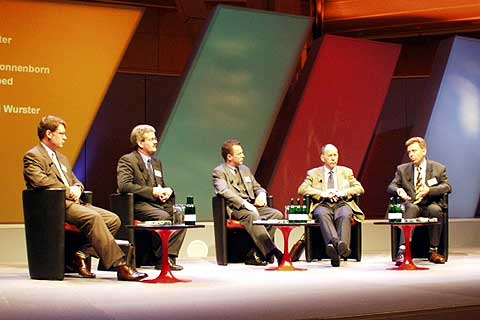
|
| |
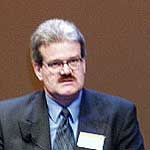 |
Dipl.-
Ing. Gotthard G. Sonneborn
Technical Director
Energiekontor AG
Stuhr, Germany
In Europe there is the potential to produce enough
hydrogen for a hydrogen-based economy, in Northern Germany
e.g. through offshore wind-parks. This renewable energies
can be used in combination with electrolyse to produce
the energy carrier hydrogen. But at the moment the direct
use from electricity via the power grid is more effective.
|
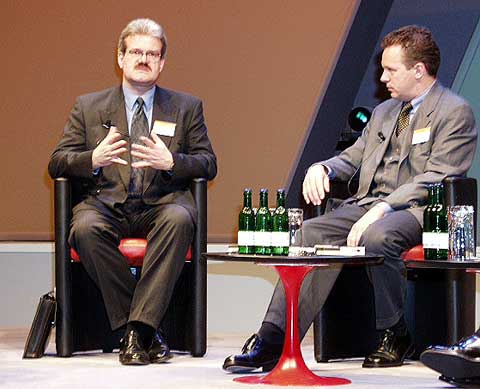
 |
Christopher
Kloed, Managing Director
Norsk Hydro Electrolysers AS, Norway
We should use our existing resources on natural gas
more environmentally friendly through reforming into
hydrogen. Our natural gas will last for approximately
10 or 15 years and the necessary units for using it
with hydrogen are already there. Of course this process
should take place together with the use of renewable
energies. To reach this target we should do more research
and development concerning electrolyse.
|
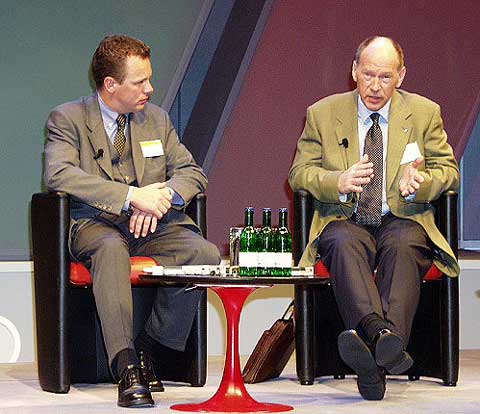
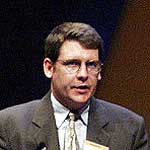 |
David
Hart
Imperial College of Science, Technology and Medicine
London, UK
The infrastructure must be improved step by step
for hydrogen. Probable this will take place together
with an improvement of the traditional power supply.
At the beginning hydrogen will close gaps in the decentralized
energy market. I can imagine future use in the a combined
system from hydrogen-car and home-energy-supply: The
car will be an additional energy-storage and can for
example cover a part of the power for your home.
|
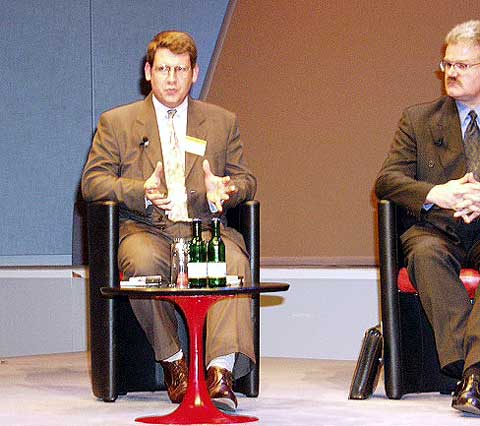
 |
Dipl.-Ing.
Reinhold Wurster
Ludwig-Boelkow-Systemtechnik GmbH
Ottobrunn, Germany
Necessary conditions for a hydrogen-based economy
are homogeneous standards and norms worldwide. The
infrastructure for the hydrogen-car can look like
this:
-
2005
The first thousand cars are on the street
-
2010
Several 100,000 hydrogen-cars are running. Perhaps
16% of the filling station will offer hydrogen to
ensure an area-wide supply.
-
2020
Hydrogen-cars will be 50% of the used vehicles.
In the future car producers, energy groups and
petroleum companies will work closer together.
|
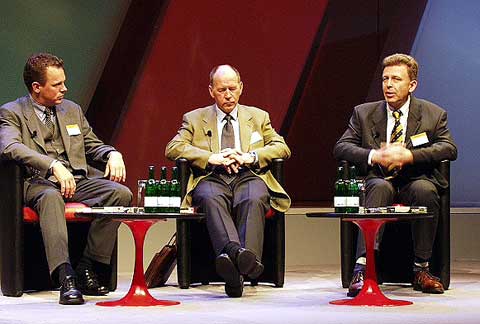
|
| 11:15 |
Morning
Coffee |
| |
|
| 11:30 |
Applications
- ready for the market
In the sector of hydrogen-technology and fuel cells there
are many different solutions, therefore it is necessary to consider
about the suitable fuel cell for varying application fields.
Independent power supply, meaning your own power unit at home,
of course is not welcome by the suppliers of electric power.
But you can imagine, that these companies provide their customers
with a back-up system (using fuel cells) as an additional service.
In the Third World there are many regions without connection
to the electrical grid. This could be a huge market, if the
people there can afford the technology. |
| |
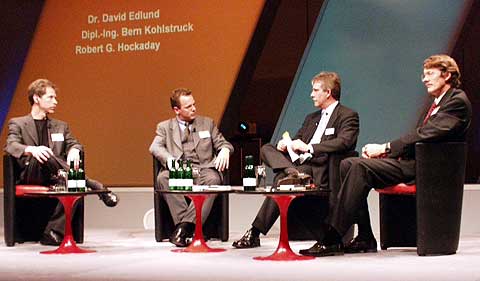
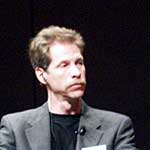 |
Dr.
David Edlund
Senior Vice President, CTO and co founder IdaTech
Bend, OR, USA
The first applications for fuel cells ready to merchandize
will be back-up systems. In California we have had use
for them recently. The technology is prepared to provide
electric power in milliseconds. And as there are more
and more suppliers for components, the fuel cell will
be affordable in the near future. If we are using PEMFC
or AFC, I cannot say yet. We will use a PEM fuel cell
in our smaller stationary systems (10Kw).
|
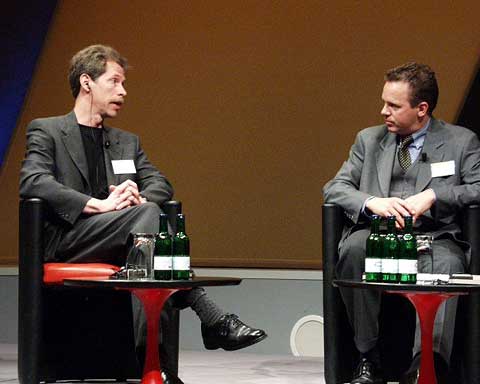
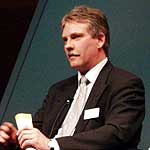 |
Dipl.-Ing.
Bernd Kohlstruck
ALSTOM BALLARD GmbH
Managing Director
Frankfurt/ Main, Germany
From the start we are interested in the upper performance
range of fuel cells. We want to build applications with
250 kW. Currently Alstom Ballard is running six test-units
with 212 kW performance together with Ballard Generation
System. Beside the advantages like environmentally friendly,
low sound emission and cost efficiency, the life-cycle
of this stacks is perfect for back-up systems. The sector
with stationary applications will benefit from the public
image thrust released by the first hydrogen-vehicles.
|
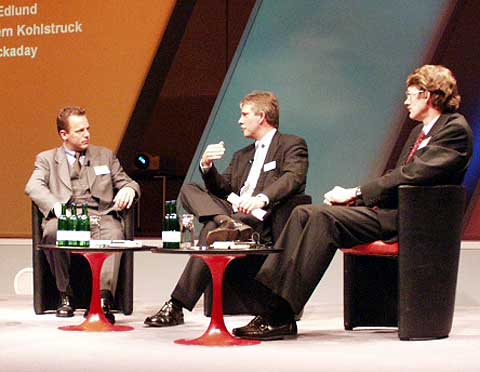
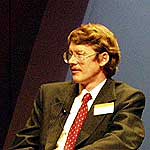 |
Robert
G. Hockaday
Chief Fuel Cell Scientist
Manhattan Scientifics, Inc.
Los Alamos, NM, USA
In several years micro fuel cells will push portable
applications for hydrogen-technology. With ten times higher
capacity, these devices will be cash cows due to their
longer time of use. At present mobile phones, laptops,
etc. are already high-tech units, so the consumer will
pay for this new technology. This will be a large market,
also I can think of FCs with 700W e.g. for bicycles or
wheel-chairs. The first prototypes for portable applications
will be in use approximately in one year. |
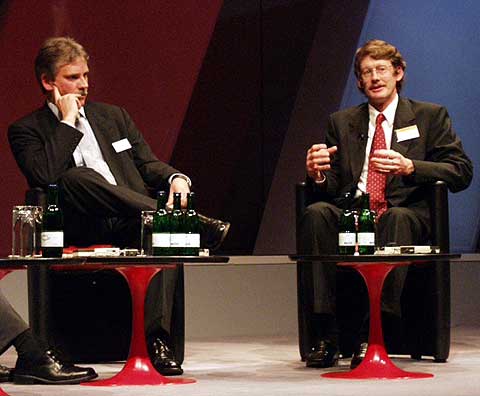
|
| 12:45 |
Lunch
break; visit of the Group Exhibits
Hydrogen + Fuel Cells in Hall 13 and Hall 18 |
| |
|
| 14:00
|
Visions
only lead to actions
A future vision is not easy to be built. Visionaries with
a high competence for hydrogen and fuel cells are needed. The
fuel cell seems to be universally usable and then to be profitable
for the companies. Maybe sometime we live to see a future with
only one tax: the energy tax. |
| |
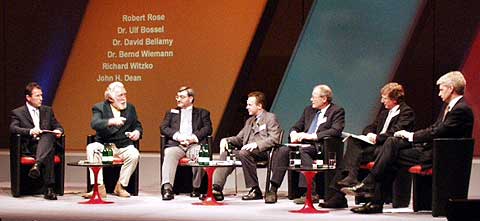
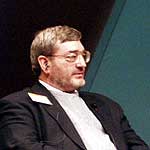 |
Robert
Rose
Executive Director
Fuel Cells 2000
Washington, DC, USA
Fuel cells have the potential to create new markets
and to dominate them. From 2003 on products ready for
the market will be available. The technology must bring
performance and the market must be confronted with realistic
prizes. However, the public must be better informed about
hydrogen to increase the acceptance. |

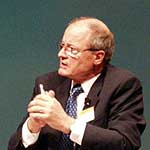 |
Dr.
Ulf Bossel
European Fuel Cell Forum
Oberrohrdorf
Switzerland
The development in the market of hydrogen technology
can not be restricted to several countries. In this area
it can only be to work together e.g. there are various
close co-operations between the USA and Europe. It is
more less a worldwide development. |
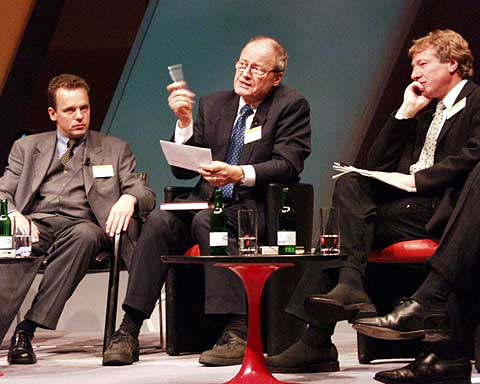
 |
Prof.
Dr. David Bellamy
Scientist, London, UK
The development of the industrial society has been
being able by the use of fossil fuel at first. But now
we have big environment damages and problems by that.
It is the time for a new technology now. Hydrogen, a clean
and safe energy solution, should be used more intensive.
For our environments sake. But the publics acceptance
for that must be increased. John Cleese or James Bond
should advertise it. This new technology must be made
"sexy". |

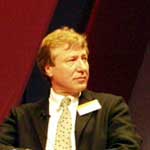 |
Dr.
Bernd Wiemann
CEO, Mannesmann Pilotentwicklungsgesellschaft mbH, Munich,
Germany
We went in the hydrogen technology years ago because
we are convinced of the potential of this sector. From
the beginning on we concentrated on the periphery needed
around the stack. Complete concepts like fuel processing
or stack management we are also interested in. We always
concentrate on the whole system. To go to the market as
early as possible we also took care of related systems
like e.g. APU (current additional supply in cars via fuel
cells). A central new task energy management will be (e.g.
with special heat exchangers). |
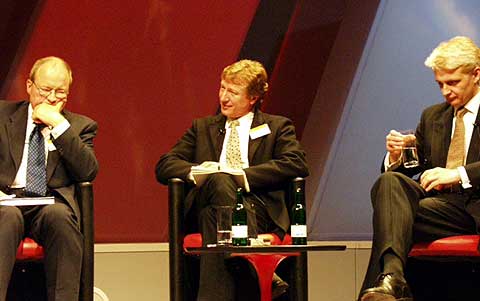
 |
Richard
Witzko
Business Leader Europe
Industrial Products Division
W.L. Gore & Associates GmbH
Putzbrunn, Germany
Apart other well known products like our membrane Goretex
we invest for ten years now in the fuel cell technology.
We believe that the first niche applications with fuel
cells can be utilized in the next few years. Then it will
be possible to make a profit by hydrogen technologies
before by the hydrogen car. |

 |
John
Dean
Director Equity Research
UBS Warburg
London, UK
It is not easy to find a solution to cover the need
for energy. This will only be possible step by step and
with different applications. A big market normally develops
after the breakthrough of one product, then other ones
will follow.
The investors like to do short-term investments. To make
that profitable it is not only technology companies need
but also a clear concepts. But investors will surely tend
to enter that sector. |
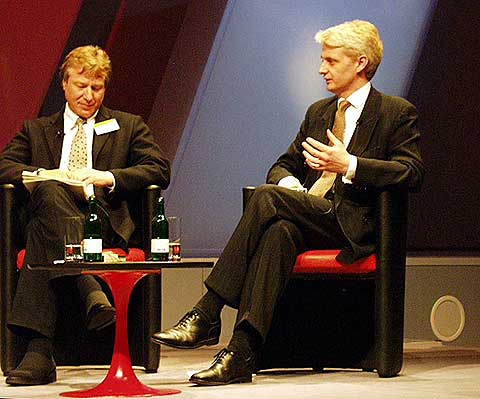
|
Organizer: Deutsche
Messe AG, Hannover
For more information about the Energy Summit go to:
http://www.energy-fair-online.com
Realization
Part III (Hydrogen):
Arno A. Evers FAIR-PR
Achheimstrasse 3
82319 Starnberg
Tel.: +49 8151 998923
Fax: +49 8151 9989243
email: arno@hydrogenambassadors.com
https://www.hydrogenambassadors.com
Click
here for International Conference 2005
Click
here for International Conference 2002
Click here for International
Conference 2000
Print
version
|
|
| |
|
|
|
